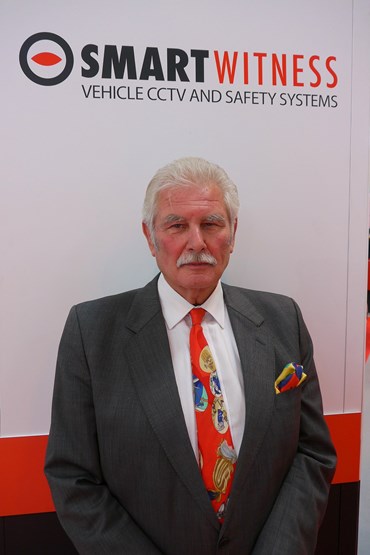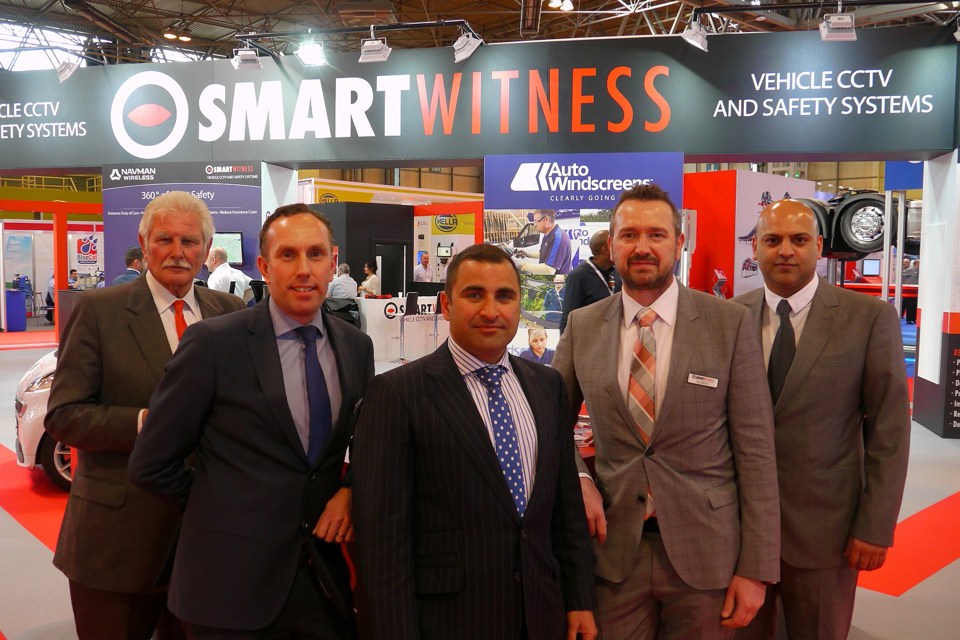Cameras in vehicles are a necessary development which will change the face of motoring. So says Keith Hellawell, former chief constable of West Yorkshire Police and drugs advisor to Tony Blair, and now non-executive chairman at dash-cam company SmartWitness.
“SmartWitness clients are seeing huge reductions in their number of accidents - as high as 80% in some fleets,” he says.
“There is no doubt they contribute hugely to improvements in road safety. Drivers are much more vigilant when they know their every move is being monitored by a camera.”
A man with a range of experience as broad as Hellawell seems like the ideal candidate to help a young company grow and expand into the future. It’s not hard to understand why he was chosen for the role. Even when he served as chief constable, he was acutely business minded.
“Rather interestingly, I was made west Yorkshire businessman of the year. I think I’m the first and last chief constable to be get that,” says Hellawell.
Factfile
Company: SmartWitness
Non-executive chairman: Keith Hellawell
Location: Croydon, Surrey
Customer base: 500,000
Products: In-vehicle cameras and telematics
“I ran the police force here as a business. It was a business with 10,000 employees, the largest vehicle fleet in the county, the largest catering organisation in the county, one billion pounds worth of property, an aeroplane and the largest call centre in the county. As a chief constable, you have to manage all these aspects. When you’re a chief constable, you’re a CEO in all but name. And I took pride in managing it the best I could.”
What attracted Hellawell to the role at SmartWitness? “I’m fortunate in that I’m able to choose what I do now, because I don’t have to work: I only do things that I think are worthwhile. When I look at a company, I look at the people involved – I liked SmartWitness’s entrepreneurial spirit,” he says.
“I felt it was a worthwhile cause. I like very much to be involved with success, and there’s a potential for a big profitable business here.”
His role will be to prepare the firm for IPO (initial public offering), following its split from parent company, security specialist YK3. He explains that SmartWitness had grown faster than YK3 had planned. “SmartWitness was this child that wanted to run. And now that child is on its own.”
“Not only is there a cost benefit to insurers when the cameras are used, but operators and drivers are able to better protect themselves“
Hellawell is a passionate believer in the power dash-cams have to make people safer and reduce costs for operators. Indeed, SmartWitness’s conception lay in reducing costs for insurance companies by cutting their number of claims,
“The first market was always insurance in terms of reducing their costs. And it’s working,” says Hellawell. “Our feedback from insurance companies is really very positive.
“Not only is there a cost benefit to insurers when the cameras are used, but operators and drivers are able to better protect themselves, in the event of a claim, by being able to prove what happened in an incident and have a better, more complete picture of the event,” says Hellawell. “You can watch the run up – you can see what a vehicle has been doing prior to the accident.”
Dash-cams can also help to reduce insurance fraud, such as false whiplash claims and ‘crash-for-cash’ scams. “The number of injuries people have been reporting has gone down. I’m not accusing people of defrauding insurance companies, but people are recognising and realising that they can’t pull the wool over insurance companies’ eyes.”
Hellawell says there are benefits beyond saving money - a key benefit being that drivers change their behaviour behind the wheel.
There is evidence to suggest more fleets are realising the benefits of putting cameras in their vehicles.
“The Road Haulage Association found that more than 50% of fleets are now fitted with the cameras, and a further 30% more were considering adopting them.
“That is 80% of the industry likely to be using cameras in the near future. That suggests they are already virtually standard,” Hellawell says.
He feels an added benefit of dash cameras has been increased driver confidence, which has obvious safety benefits in itself, despite industry fears that the cameras may have been seen as an instrument for “big brother”.
“Once you have fitted a camera in your car, you never go back. Inevitably the big vehicle manufacturers will start offering in-vehicle cameras”Keith Hellawell, SmartWitness
“I think the cameras were initially seen by drivers as something that would be an imposition on them. But I don’t think it is,” says Hellawell. “They’re seeing it as a driver aid in a way, and they’re seeing it as protecting them.
“If something does happen, and they’re not at fault, they can feel confident when showing that it wasn’t their fault so it’s giving confidence to people, where one of our fears was that it would be seen as an imposition that they didn’t want.
“The stupid ones weren’t too happy about it…but the stupid ones are few and far between now, I think.”
Safety benefits ‘can go even further’
But what does the future hold for the dashboard camera industry? Hellawell feels that the safety benefits can go even further, and that in-vehicle cameras will play a greater role in public safety by monitoring what’s going on with the passengers themselves, protecting them from crime, not just focusing on what the driver is doing.
“I believe the cameras should be there, in buses and other public transport vehicles,” he says.
Hellawell also cited Russia when predicting the future of in-vehicle cameras. “I do think the UK will become like Russia where the majority, if not all, motorists have dashcams.,” he says.
“You only have to see how quickly they have been adopted in fleet. Eventually those trends will transfer more comprehensively to private motorists.”
He added: “The key point for me is that once you have fitted a camera in your car, you never go back. It is the same with sat-navs. Who goes back to a road atlas after they have tried one of those? Inevitably the big vehicle manufacturers will start offering in-vehicle cameras.”
With fleet decision-makers continually having to reduce risk, perhaps dash-cams could become a common fixture.
Hellawell says SmartWitness is seeing more operators starting to view them as an “adjunct to telematics”. It is possible that dash-cams could soon be the next big thing.
Management – Hellawell style
 Keith Hellawell is a highly experienced manager, having held senior roles at large corporations such as Masternaut and IBM. Here, he shares some advice about his management style.
Keith Hellawell is a highly experienced manager, having held senior roles at large corporations such as Masternaut and IBM. Here, he shares some advice about his management style.
“My style is very straightforward, very honest, facilitative and supportive. What I hate in management is when you don’t have clarity of what’s expected or required of you,” he says. “I think people should have clarity and know the boundaries of their work and know if they go beyond those boundaries. They’re going to need to deal with the consequences.”
Hellawell also discourages punishing those working for you by giving them tasks they do not like or using other measures to penalise them if they under-perform. “Often in the police service, if you were doing a bad job, nobody would tell you,” he explains. “Instead, you’d be given a ‘bad beat’. I feel it’s far better to be direct. I prefer to say: this is what you’re doing, this is how you’re doing it wrong, this is how you can do it better.
“If you feel they need help, confrontation doesn’t really help.”
He also believes in recognising the skills of those working for you, and understanding they might know something that you don’t. “Some managers feel insecure about asking their subordinates for advice, but I don’t. It’s not a weakness to ask advice from those working for you.”

















Allan - 21/08/2015 20:12
I have the original Smart Witness camera for several years now in my personal vehicle. It's helped me when getting pulled over by police as well resolving an accident very quickly! I got pulled over for going through a "yellow" light but the officer saw my camera and decided it wasn't worth risking his judgment in court!